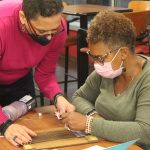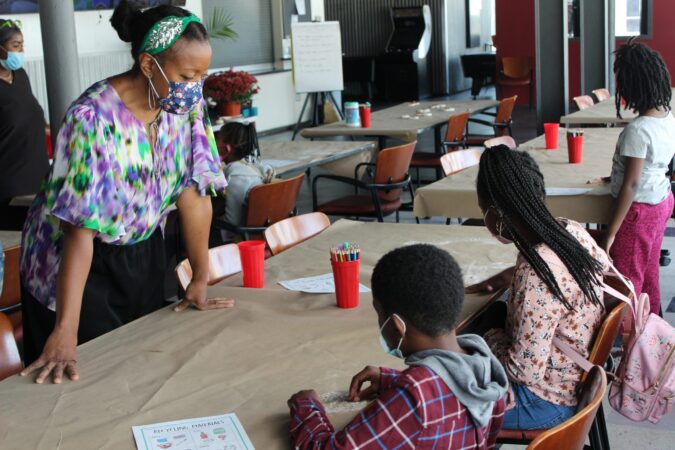In the midst of an incredibly successful career, native Detroiter, and world-renowned fashion designer Tracy Reese says the thing she is most proud of is “Making women look good and feel great about themselves.” She goes on to say “Fashion has the power to do this, and so much more.”
This power is making an impact on Detroit and serving to bridge many gaps now – and if Tracy gets her wish – well into the future in a big big way.
We sat down with Tracy to get her perspective, and will then launch a 3-part series to cover facets of the fashion industry, in Detroit, in the upcoming months.
ABOUT TRACY REESE
Taught by her mother, Reese cultivated a love for sewing at a very young age. Throughout her teenage years, and guidance from some great teachers at Cass Tech High School led her to the Parsons School of Design in New York City, quite a leap from Detroit, where she immersed herself in the breadth and power of the industry.
Reese has gone on to have her designs featured in the top fashion publications including Vogue, Elle, Glamour, InStyle, O, the Oprah Magazine, and worn by First Lady Michelle Obama, Sarah Jessica Parker, and Taylor Swift.

FROM THE HOPE FOR FLOWERS SUSTAINABLE APPAREL COLLECTION
In 2018, after working in NYC for over 30 years, she began to feel a strong desire to make a stake back in her hometown. So she bought a house and moved home.
In 2019, Reese launched a sustainability-focused brand – Hope for Flowers – and produced a capsule collection made entirely in Michigan.
Reese currently has a design studio in Midtown Detroit with a staff of five. She is building out an in-house sample room and dedicated sewing workshop with dressmakers trained to make her designs.
Her vision is to have a beautiful ecosystem for manufacturing in Detroit and through the power of fashion, bridge gaps in the community, industry, sustainability, and our next generation.
Albeit a lofty goal, many pieces are being put into place to reach it, and with dedication, drive, energy, and collaboration, things in Detroit are beginning to shift.
EMPOWERING INDIVIDUALS
Circling back to her pride in making women look and feel good, Tracy speaks of her very early years in New York City where she joined a business development support group through her church. She tells the story of a meeting at which each person was asked to share what industry or business they were involved in, and as each person spoke she began to feel humbled and even embarrassed, being surrounded by others doing seemingly big, important things. When it came to her, she said quietly
“I design clothes,” and the woman next to her reached out and said, “Oh my dear, you have the power to make people feel good about themselves.”
It is this that has driven Tracy each day, month, and passing year of her career since. If fashion can empower women personally to feel better, stronger, more confident, imagine what it can do for entire communities and in shaping our city’s culture and society as a whole.
EASING THE SOCIAL DIVIDE
Reese recalls her youth in the city and dressing for church, for concerts, for events. “Fashion, I believe, has always been a big part of our culture in Detroit.”
It’s true. In the ’60s women flocked to shop, see, and be seen at vibrant new stores on Woodward Avenue and Livernois Avenue — an area that came to be known as Detroit’s Avenue of Fashion including B. Siegel, Billy’s Clothing Store, Mamzell’s Custom Hats, Hudson’s, Sibley’s Shoes, and Jacobson’s.
Fast forward to 2021 and Reese shares a current event.
My nephew recently performed with Complexions Contemporary Ballet at the Detroit Music Hall outdoor Amphitheater and people turned out in full fashion, she says. It was so wonderful to experience the energy, the pride Detroiters took in presenting themselves in such a way for such an event. Fashion crosses colors, sexes, races … it has the ability to bring people together in this wonderful parade of color and beauty and confidence, says Reese.
SHARING VOICES TO CREATE CHANGE
“There are many Detroiter’s who want to be a part of this industry – from manufacturing to design we have a lot of talent doing a lot of things on their own, without much exposure or support,” Reese says. “My hope is to collaborate with entities who are working toward change – and help bring our efforts together and lift up these artisans and this local talent.”

AT THE TRACY REESE MIDTOWN DETROIT DESIGN STUDIO
Producing locally is also a major priority for Reese. “We are currently over-reliant on import and it’s important to bring manufacturing home. Not just to ease logistics, but when we start to bring back the pride that comes from making things ourselves and getting back to creating items on our own and not just being consumers.”
One entity that is hard at work putting people to work and driving this change is ISAIC (Industrial Sewing and Innovation Center). Located above the Carhartt store, ISIAC is offering education, apprenticeships, and careers and is committed to near-shoring, workforce development, and sustainability.
Reese says that between the MEDC opening grants, the work and opportunity ISIAC is offering and collaborations between suppliers, determining the totality of the infrastructure needed to make it a reality is starting to happen.
Certainly, a vital piece of this is the retailers who support and carry local and sustainable brands. Reese points to Detroit is the New Black, Eugenia, and Alchemy as a few terrific examples.
“These women have created important and ground-breaking business models and with retailers like them we continue to get closer to our vision,” says Reese.
FUELING OUR YOUTH
“Bringing creative outlets and opportunities to our city’s youth is a conversation that needs to happen over and over,” says Reese. “So much has been stripped away from the public schools in terms of the arts, we need to create ways to layer this back into the lives of our children.”
So, in addition to scaling her own business, sharing time between Detroit and NYC, and her dedication to advocacy and partnerships, Reese just launched an Art Enrichment Program – offering Saturday morning art classes to Detroit Public School children.

NATIVE DETROITER AND WORLD RENOWNED FASHION DESIGNER, TRACEY REESE
Additionally, the Detroit Boys and Girls Club, Industry Club, Detroit is the New Black and other retailers have been heavily involved in offering paid retail and fashion merchandising experience to young adults in the city. “These kids are showing up and wanting to learn and work,” Reese says.
For Reese, part of offering art education for youth involves sharing information on more sustainable life choices. “We need to share these tools with our young people for them to make actual change in the future. I’m still learning as well, and working to walk the walk, and see every day as a new opportunity for doing things better for our community and our environment.”
CRAFTING AND EXECUTING ETHICAL SOLUTIONS
In that vein, Reese uses only use textiles that are gentle on the earth and healthier for the individuals who are milling and weaving. She works to run a business that treats all with respect and pays fair wages. She works to make choices and use her voice to amplify the voices of workers all over the world who make our clothing, saying “we have to do this, and teach others.”
As always, be sure to subscribe to our newsletter for regular updates on all things Detroit and more.






















